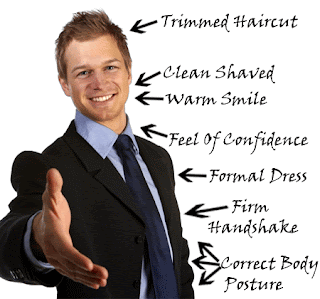PROCESS OF PREPARING THE INTERVIEWAND HOW TO INTERVIEW
Qualifications for the Job
Suitability for the specific job is judged on the basis of:• Academic preparation
• Work experience
• Job-related personality traits
When you’re invited to interview for a position, the interviewer may already have some idea of whether you have the right qualifications, based on a review of your resume. But during the interview, you’ll be asked to describe your education and previous jobs in more depth so that the interviewer can determine how well your skills match the requirements. In many cases, the interview will be seeking someone with the flexibility to apply diverse skills in several areas. Pre-employment tests attempt to provide objective, quantitative information about a candidate’s skills, attitudes, and habits.
Pre-employment Test
Three types of pre-employment tests frequently administered by companies are job skill tests, psychological tests, and drug tests. Job-skill tests, the most common type, are designed to access competency or specific abilities needed to perform a job. Psychological tests usually take the form of questionnaires. These tests can be used to assess overall intellectual ability, attitudes toward work, interests, managerial potential, or personality characteristics – including dependability, commitment, honesty, and motivation. Drug tests are not conducted in our country, however they are conducted abroad.Preparing for a Job Interview
For a success interview, preparation is mandatory. The best way to prepare for a job interview is to think about the job itself. It’s perfectly normal to feel a little anxious before an interview. But good preparation will help you perform well. Be sure to consider any cultural differences when preparing for interviews, and base your approach on what you audience expects. Before the interview, learn about the organization, think ahead about questions, bolster your confidence, polish you interview style, plan to look good, and be ready when you arrive.Learn About the Organization
Planning your employment search, you probably researched the companies you sent your resume to. But now that you’ve been invited for an interview, you’ll want to fine-tune your research and brush up on the facts you’ve collection.Today’s companies expect serious candidates to demonstrate an understanding of the company’s operations, its market, and its strategic and tactical problems. Learning about the organization and the job enables you to show the interviewer just how you will meet the organization’s particular needs.
Planning for a Successful Interview
How can you practice for a job interview? What are some questions that you might be asked, and how should you respond? What questions are you not obligated to answer? These entire questions are important for interviews.Think Ahead about Interview Questions
Planning ahead for the interview questions will help you handle them more confidently and intelligently. Moreover, you will want to prepare intelligent questions of your own.Interview Strategies
You may be asked the following questions.1. What was the toughest decision you ever had to make?
2. Why do you want to work for this organization?
3. Why would we employ you?
4. If we hire you, what changes would you make?
5. Can we offer you a career path?
6. What are your greatest strengths?
7. What are your greatest weaknesses?
8. What didn’t you like about previous job you’ve held?
9. Are there any weaknesses in your education or experience?
10. Where do you want to be five years form now?
11. What are you salary expectations?
12. What would you do if……
13. What type of position are you interested in?
15. Tell me something about yourself.
16. Do you have any question about the organization or the job?
Bolster Your Confidence berfore Interview
If you feel shy or self-conscious, remember that recruiters are human too. By building your confidence, you’ll make a better impression. The best way to counteract any apprehension is to remove its source. You may feel shy or self-conscious because you think you have some flaw that will prompt others to reject you. Bear in mind, however, that you’re much more conscious of your limitations than other people are.Polish your interview Style
Staging mock interview with a friend is a good way to hone your style. Nonverbal behaviour has a significant effect on the interviewer’s opinion of you. Confidence helps you walk into an interview, but once you’re there, you want to give the interviewer an impression of poise, good manners, and good judgment. Some job seekers hire professional coaches and image consultants to create just the right impression.Plan to Look Good
To look like a winner• Dress conservatively
• Be well groomed
• Smile when appropriate
Physical appearance is important because clothing and grooming reveal a candidate’s personality and professionalism. When it comes to clothing, the best policy is to dress conservatively. Wear the best-quality businesslike clothes you can, preferably a dark, solid colour.
Interviewing for Success
Be prepared for the interview by• Taking proof of your accomplishments
• Arriving on time
• Waiting graciously
How you handle a particular interview depends on where you stand in the interview process. If you’re being interviewed for the first time, your main objective is to differentiate yourself from the many other candidates who are also being screened.
Of the three stages, the warm-up is the most important, even though it may account for only a small fraction of the time you spend in the interview. Psychologists say that 50 percent of an interviewer’s decision is made within the first 30 to 60 seconds, and another 25 percent is made within 15 minutes. If you get off to a bad start, it’s extremely difficult to turn the interview around.








0 comments:
Post a Comment